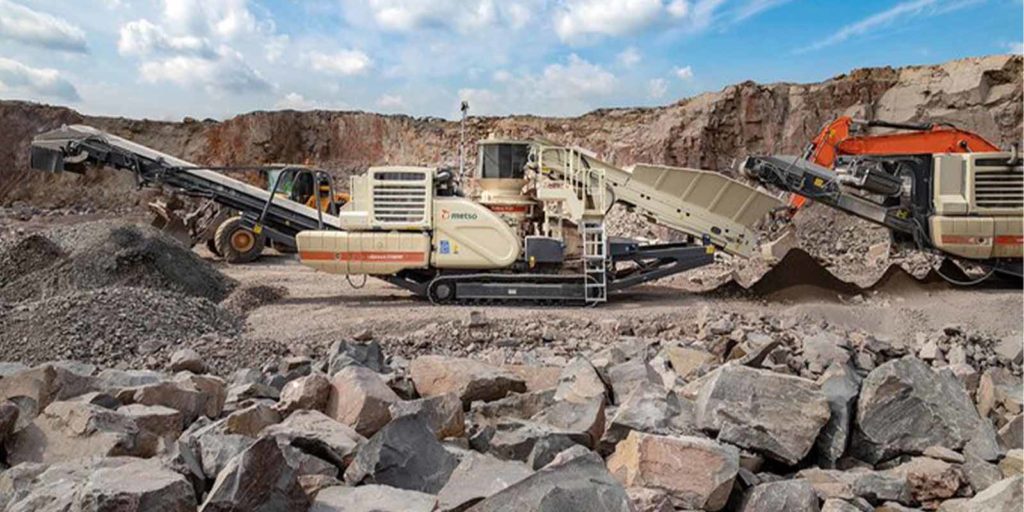Industrial rock crushers are an important part of the construction industry. Many construction projects require a specific type of aggregate to provide support and reliable infrastructure for the entire operation. If you don’t understand the most important details about this equipment, you may make mistakes or poor decisions that could jeopardize the success of the project.
There are different types of rock crushers, and it is important to understand the differences to select the right type for your operation. Understanding your crusher operation means your equipment works together seamlessly and leads to the most efficient workflow.
What Are Industrial Rock Crushers?
One of the most common questions regarding rock crushers is whether or not an industrial-sized crusher is necessary for a project.
Construction operations vary in size and scope, so it’s important to know when an industrial rock crusher is needed. Generally speaking, if the project involves a larger than normal amount of debris or rock that needs to be crushed down to size, then using an industrial crusher is the most efficient way to do it. This type of equipment can handle large pieces of material quickly and easily, making the process move smoothly.
Additionally, portability is an important factor to weigh. Most industrial crushers are not portable and are mainly used as stationary workhorses. This can vary, however, as sometimes an array of smaller rock crushers can achieve a great deal for a cheaper price. It all depends on the size and scope of your rock-crushing needs.
Understanding the Stages of Rock Crushing
Industrial rock crushers can be used for a variety of different stages. In a lot of projects, construction managers opt to use a circuit of smaller rock crushers that specialize in the different stages of rock crushing. This depends on the needs of the project, though, because some operations only require a primary crusher to reach the desired aggregate size and consistency, while others may need rock crushers that can handle each stage of the process.
The first stage of the crushing process is the primary crushing stage. This is where the rocks are crushed down to a size that is manageable for the secondary crushing stage. In the secondary crushing stage, rocks are crushed down to smaller sizes, typically around three to five inches in diameter. Finally, in the tertiary crushing stage, rocks are reduced down to even smaller sizes, usually one to three inches in diameter. The tertiary stage processes aggregate for final delivery into a specific size. Overall, as each stage progresses, the ability to create a specific size and consistency of aggregate grows.
Industrial Rock Crushers vs Normal Rock Crushers
Industrial rock crushers are a heavy-duty machine that smashes large rocks into smaller pieces. Industrial crushers are typically used in quarries and mines, where gigantic, hard-to-manage chunks of rock need to be broken down into smaller ones. Industrial crushers can also be used in construction sites, where they crush concrete and asphalt into smaller pieces.
Industrial crushers are much larger and more powerful than portable crushers. Industrial crushers break down large rocks into small pieces in just a few minutes, while portable crushers can take hours or even days to do the same job. Industrial crushers are also much more expensive than portable crushers, but the benefits they provide can make them well worth the investment if it is a good fit for your needs.
Industrial rock crushers are versatile, powerful pieces of equipment. They can handle rock crushing at any stage of the process and serve as an all-in-one powerhouse.
An industrial crusher is a must-have for any operation needing to break down large chunks of rock. Reliable, efficient, and durable, industrial crushers can handle even the most challenging jobs. However, if your job requirements only need a crusher that specializes in a certain stage or type of aggregate, opting for a smaller, more focused piece of equipment may be the best option. Additionally, if your machine needs to be mobile and moved as necessary, then portable options are a much more affordable and versatile choice.
Finding the Right Equipment for Your Unique Needs
If you’re considering a construction project and are unsure whether or not you need an industrial rock crusher, contact a professional for assistance. They can help you determine what type of equipment is best for you based on the specifications and requirements of your project. Both industrial and normal rock crushers are powerful pieces of equipment, and choosing the right kind can make or break the efficiency and success of your next project!
For more information, reach out to our team of experts today at 855.554.1606.

